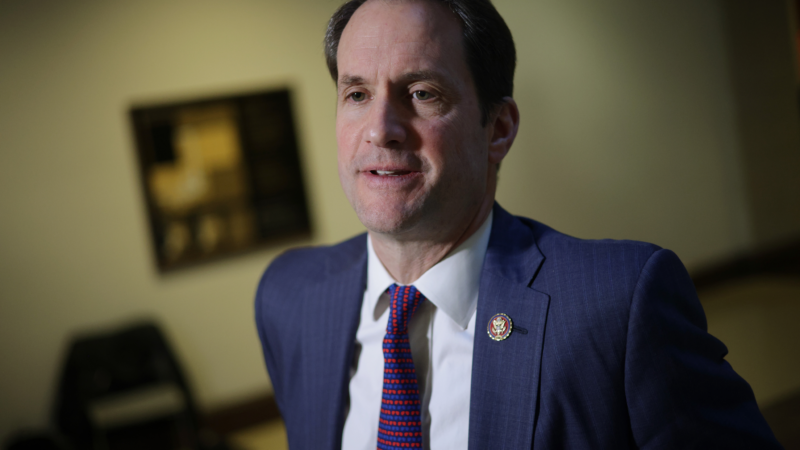‘An unbelievable cocktail of incompetence’: a U.S. representative on Signal messages
The Atlantic has published the text messages from a group chat on Signal, a messaging app, in which top U.S. defense and intelligence officials shared planned military airstrikes on Yemen targeting Iranian-backed Houthi rebels.
The incident is raising questions about the administration’s use of Signal, or apps in general, to discuss highly sensitive plans.
Rep. Jim Himes of Connecticut, the top Democrat on the House Intelligence Committee, told Morning Edition that the information shared in the text exchange should have been classified “at the highest levels.”
“This is just an unbelievable cocktail of incompetence and [an] awful handling of critical information,” Himes said.
Jeffrey Goldberg, editor-in-chief at The Atlantic and the journalist who received those messages, said he decided to release more messages today after several administration officials, including President Trump, Defense Secretary Pete Hegseth, and the Director of National Intelligence Tulsi Gabbard, asserted that Goldberg was lying and said no classified information was shared in the group chat.
Himes, who is questioning top defense and intelligence officials, again, during a House Intelligence committee hearing today, spoke to NPR’s Leila Fadel about the text exchange on Signal.
The following excerpt has been edited for length and clarity.
Interview highlights
Leila Fadel: Have you had a chance to review these texts that were just published in The Atlantic?
Jim Himes: I have, yeah. And needless to say, what we see this morning is inconsistent with what we were told by the intelligence community leaders yesterday and is just beyond the pale in terms of information that was put at risk.
Fadel: Reading these texts, I’m reading exact times, you know, “time now, weather is favorable, just confirmed with CENTCOM” – which is Central Command – “we are a go for mission launch,” and then times of bombings.
Is this something that would be typically classified?
Himes: Absolutely. Absolutely. And classified at the highest levels. And it’s not hard to understand why. Because if that information were to escape – were to be taken by the Russians or the Chinese, it could be instantly conveyed to the Houthis, who are actually pretty sophisticated.
And so how do the Houthis respond to that? Frankly, any enemy that is about to be attacked by the United States, that has given them warning because for three days officials have been putting the information up on Signal. So what happens? The Russians convey the information to the Houthis. The Houthis now know to move everybody, to move their equipment, to move their anti-aircraft equipment, to a place where they might be able to shoot down a pilot, where they might be able to sink a ship, because now they know when and with what the United States is going to attack.
So, I can’t think of many operational details or many bits of information that are quite so important to keep secret than what we just saw released by The Atlantic.
Fadel: CIA Director John Ratcliffe, National Intelligence [Director] Tulsi Gabbard – both were in that group chat. You will be questioning them later today. What are you going to ask them after seeing these texts?
Himes: It’s one of those questions [of] where to begin, right? I mean, with a screwup of this magnitude, there’s only one response, which is, ‘We are terribly sorry. We are standing down. We will do the investigations. We will get to the bottom of this. We will make sure it never happens again. And there will be accountability for the people who were involved.’
You know what we didn’t [hear] yesterday? A single one of those assertions. Instead, we saw attacks on Jeffrey Goldberg. And we saw, quite frankly – and this is a specific answer to your question – what appear to be at best, misstatements.
Director Patel, Director Gabbard were asked whether the conversation included information on weapons, packages, targets or timing. They said, ‘No, not that I’m aware of, no precise operational details.’ And of course, now we have the four significant figures in military time, exactly what time the FA teams are taking off and the fact that they will be accompanied by a MQ-9 Reaper drones. So I mean, again, where to start?
This is just an unbelievable cocktail of incompetence and [an] awful handling of critical information.
NPR disclosure: Katherine Maher, the CEO of NPR, chairs the board of the Signal Foundation.
The digital copy was edited by Treye Green and Kristian Monroe.
Rideshare union rights, social media limits and other state laws taking effect Jan. 1
Every new year, public media reporters across the country bring us some of the new state laws taking effect where they are. Here are six in 2026.
Guides to help you tackle your New Year’s resolutions
From building your strength to tackling credit card debt, NPR's Life Kit has a newsletter journey to help you tackle your New Year's resolution.
Guides to help you tackle your New Year’s resolutions
From building your strength to tackling credit card debt, NPR's Life Kit has a newsletter journey to help you tackle your New Year's resolution.
Dozens presumed dead in fire at Swiss Alps bar during New Year’s celebration
Dozens of people are presumed dead and about 100 injured, most of them seriously, following a fire at a Swiss Alps bar during a New Year's celebration, police said Thursday.
Warren Buffett officially retires as Berkshire Hathway’s CEO
The legendary 95-year-old investor spent decades building his company into one of the world's largest and most powerful. Now Greg Abel is taking it over.
Crypto soared in 2025 — and then crashed. Now what?
For most of 2025, cryptocurrencies such as bitcoin surged as President Trump vowed to make the U.S. a crypto leader. But now, a severe sell-off has shaken the sector.






